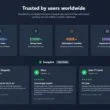|
Getting your Trinity Audio player ready...
|
Large Language Models (LLMs) are revolutionizing industries across the board. These AI powerhouses are not just theoretical concepts anymore. They’re being put to work in real-world scenarios, solving problems and boosting efficiency.
Healthcare
In healthcare, LLMs are making waves in several areas. They’re assisting doctors with diagnoses by analyzing patient data and medical literature. This helps identify potential issues that might be overlooked.
LLMs are also streamlining administrative tasks in hospitals and clinics. They can summarize patient records, draft medical reports, and even schedule appointments. This frees up healthcare professionals to focus on patient care.
Drug discovery is another field benefiting from LLMs. These models can process vast amounts of scientific literature and clinical data. They identify potential drug candidates and predict their effectiveness, speeding up the research process.
Mental health support is an emerging application for LLMs. They’re being used to create chatbots that offer initial counseling and support. While not replacing human therapists, these bots can provide immediate help in crisis situations.
Education
LLMs are transforming the education sector in multiple ways. They’re being used to create personalized learning experiences for students. These models adapt to each learner’s pace and style, offering tailored content and exercises.
Teachers are using LLMs to generate lesson plans and educational materials. This saves time and allows for more diverse and engaging content. The models can also help grade assignments and provide detailed feedback to students.
Language learning apps are leveraging LLMs to offer more natural conversations. Learners can practice with AI that understands context and nuance. This provides a safe space to make mistakes and improve language skills.
LLMs are also assisting in research and academic writing. They can help students find relevant sources, summarize complex texts, and even suggest improvements to their writing.
Finance
The finance industry is embracing LLMs for various applications. They’re being used for risk assessment in lending and insurance. These models can analyze vast datasets to identify patterns and potential red flags.
Customer service in banking is being enhanced by LLM-powered chatbots. They can handle a wide range of queries, from account inquiries to investment advice. This improves response times and customer satisfaction.
Fraud detection is another area where LLMs excel. They can analyze transaction patterns and user behavior to spot anomalies. This helps financial institutions protect their customers and assets more effectively.
Investment firms are using LLMs to analyze market trends and news. These models can process huge amounts of financial data and news articles. They provide insights that help traders make more informed decisions.
Legal
In the legal field, LLMs are streamlining document review processes. They can quickly analyze large volumes of legal documents, contracts, and case law. This saves lawyers countless hours of manual review.
LLMs are also being used to draft legal documents and contracts. They can generate initial versions based on specific requirements and legal precedents. Lawyers then review and refine these drafts, saving time on routine tasks.
Legal research is another area benefiting from LLMs. These models can quickly find relevant cases and statutes. They provide summaries and highlight key points, making research more efficient.
Some law firms are using LLMs to enhance client interactions. They power chatbots that can answer basic legal questions and provide initial guidance. This improves client service and frees up lawyers for more complex tasks.
Manufacturing
In manufacturing, LLMs are improving quality control processes. They analyze data from sensors and inspection reports to identify potential issues. This helps prevent defects and improves overall product quality.
Predictive maintenance is another key application in this sector. LLMs process data from machinery to predict when equipment might fail. This allows for timely maintenance, reducing downtime and extending equipment life.
Supply chain optimization is benefiting from LLM analysis. These models can process vast amounts of data on suppliers, logistics, and market demand. They help companies make better decisions about inventory and distribution.
Product design is also being enhanced by LLMs. They can analyze customer feedback and market trends. This helps designers create products that better meet consumer needs and preferences.
Retail
Retail businesses are using LLMs to personalize customer experiences. These models analyze shopping history and preferences to recommend products. This increases sales and improves customer satisfaction.
Inventory management is being optimized with LLM analysis. The models predict demand based on various factors like seasons and trends. This helps retailers stock the right products at the right time.
Customer service in retail is being transformed by LLM-powered chatbots. They handle inquiries about products, orders, and returns. This provides quick responses to customers and reduces the load on human staff.
LLMs are also being used for market research in retail. They analyze social media, reviews, and other online content. This provides insights into consumer sentiment and emerging trends.
Media and Entertainment
Content creation is a key application of LLMs in media. They’re being used to generate scripts, articles, and even social media posts. This helps content creators overcome writer’s block and produce more diverse material.
Recommendation systems in streaming services are powered by LLMs. They analyze viewing habits and content metadata to suggest shows and movies. This keeps viewers engaged and helps them discover new content.
In the gaming industry, LLMs are creating more dynamic narratives. They generate dialogue and plot points based on player actions. This leads to more immersive and personalized gaming experiences.
LLMs are also assisting in content moderation on social media platforms. They can identify potentially harmful or inappropriate content. This helps maintain a safer online environment for users.
Agriculture
In agriculture, LLMs are helping farmers make data-driven decisions. They analyze weather patterns, soil conditions, and crop data. This helps optimize planting schedules and resource allocation.
Pest and disease management is being improved with LLM analysis. These models can identify early signs of infestation or disease. This allows for timely interventions, reducing crop losses.
LLMs are also being used to optimize livestock management. They analyze data on animal health, feeding patterns, and environmental conditions. This helps farmers improve animal welfare and productivity.
Sustainable farming practices are being promoted through LLM-powered advisory systems. These models provide recommendations on water usage, fertilizer application, and crop rotation. This helps reduce environmental impact while maintaining productivity.
Transportation and Logistics
In transportation, LLMs are optimizing route planning and traffic management. They analyze real-time data on traffic, weather, and vehicle locations. This helps reduce congestion and improve delivery times.
Predictive maintenance in the transportation sector is benefiting from LLMs. These models analyze data from vehicle sensors to predict potential failures. This allows for timely maintenance, improving safety and reducing downtime.
LLMs are also enhancing customer service in transportation and logistics. They power chatbots that handle booking inquiries, track shipments, and resolve issues. This improves customer satisfaction and reduces operational costs.
In the aviation industry, LLMs are being used for flight planning. They analyze weather patterns, air traffic, and aircraft performance data. This helps optimize routes and improve fuel efficiency.
Energy
The energy sector is using LLMs to optimize grid management. These models analyze consumption patterns and predict demand fluctuations. This helps balance supply and demand, reducing waste and improving reliability.
Renewable energy planning is benefiting from LLM analysis. These models process data on weather patterns, geography, and energy consumption. This helps identify optimal locations for wind and solar farms.
LLMs are also being used to improve energy efficiency in buildings. They analyze data from smart meters and environmental sensors. This helps optimize heating, cooling, and lighting systems, reducing energy consumption.
In oil and gas exploration, LLMs are analyzing geological data. They help identify potential drilling sites and assess risks. This improves the efficiency and safety of exploration activities.
Future of LLMs
The applications of LLMs across industries are vast and growing. From healthcare to agriculture, these models are solving real-world problems. They’re improving efficiency, enhancing decision-making, and creating new possibilities.
As LLM technology continues to advance, we can expect even more innovative applications. The key will be balancing the benefits with ethical considerations. Proper implementation and oversight will be crucial.
The future of LLMs in industry is bright. They have the potential to drive significant progress in many sectors. As we continue to explore their capabilities, we’re likely to discover even more ways they can benefit society.








